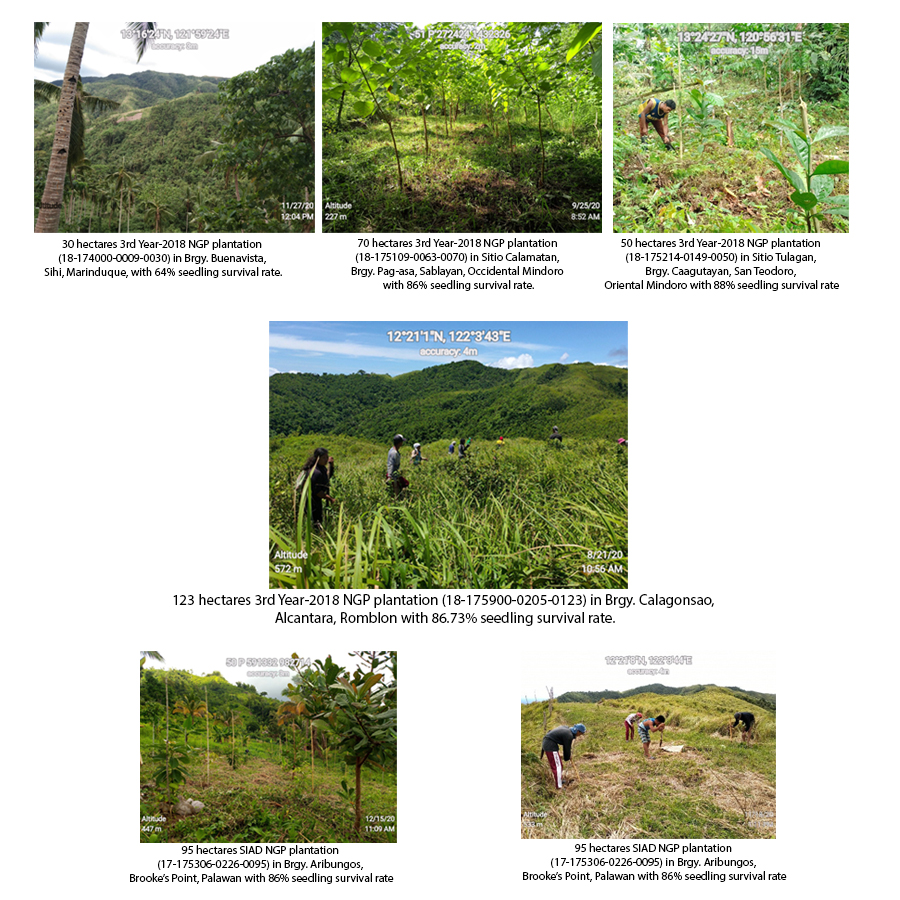
As one of the government's priority programs to rehabilitate the country's denuded and degraded forestlands, NGP plantations established in 2018 achieved an average of 77% seedling survival rate – perceiving NGP's highest number of survived seedlings since 2011.
Towards Environmental Stability
This progress prompts an impact favorable to the country's environmental state – a more extensive forest cover. As the country faces deforestation, the number of survived seedlings serves as the first step towards achieving a more robust and sustainable forest cover. Subsequently, a more extensive forest cover will result in more carbon sinks, more fertile soils, renewable energy provision, a natural barrier against disasters, climate regulation, habitat to floral and faunal species, and more livelihood opportunities.
In NGP, each newly established plantation site undergoes three-year maintenance and protection (M&P) cycle to ensure that all areas are adequately surveyed, monitored, and maintained. Once a plantation site finishes its three-year M&P cycle, it is now categorized as a graduated NGP plantation site.
"From the average survival rate between 38% and 41% of the previous graduated NGP sites, last year's (2020) survival rate of 77% is reflected as the most remarkable and prominent improvement in DENR MIMAROPA's NGP implementation," Regional Executive Director (RED) Maria Lourdes G. Ferrer exclaimed.
For 2018 graduated NGP plantations, the MIMAROPA Region efficaciously maintained and protected 10,549.66 hectares out of 12,222.49 hectares of area with a 77% survival rate or 9,760,216 surviving seedlings. Among the five PENROs of MIMAROPA, Oriental Mindoro and Palawan attained 86% -- excellent progress in the survival rate for their NGP plantations. Furthermore, in 2018, graduated plantations of PENROs Marinduque, Romblon, and Occidental Mindoro acquired an average of 81%, 75%, and 50%, respectively.
Towards Poverty Alleviation
The COVID-19 pandemic started to create turmoil in the country's welfare and the economy last year (2020); it tremendously affected the marginalized community as they gradually lose their jobs and livelihood opportunities. Communities then grabbed the program as their opportunity to acquire extra income for their sustenance during a global pandemic.
As part of NGP's core objectives, the Region contributes to poverty reduction as it generated 27,299 jobs and employed 5,821 persons under the NGP-Community-Based Employment Program (NGP-CBEP) despite the pandemic last 2020.
Community-Based Employment Program (CBEP) is a labor-based activity program that includes all infrastructure or non-infrastructure government programs that give short or long-term jobs to skilled, semi-skilled, and low-skilled workers in a local community where the program will be implemented.
Most of NGP's local beneficiaries and partnered peoples' organization (POs) help plantation establishment, maintenance and protection of plantations, site preparation, and seedling production. The PENR and CENR Offices also hire Forestry Extension Officers (FEOs) and Technical Support Staff to monitor and evaluate the NGP sites.
Local contractors shared that NGP has always been able to provide opportunities to their communities, especially globally. Aside from this, Gloria Miguel, Chairman of Barangay San Manuel, Puerto Princesa City, also added that NGP helped their Sitio rehabilitate their bamboo plantation area that illegal cutting destroyed.
"It is worth highlighting that the NGP were able to help 5,821 persons to acquire jobs that would support them amidst the uncertainties brought by the pandemic last 2020," RED Ferrer shared.
Towards a Greener 2021
As the Region's most outstanding achievement, Regional NGP Coordinator Manuel T. Escasura expects all PENROs and CENROs to ponder their exhibited strengths and weaknesses in 2020 as their guide to continually improve and expand their NGP performance this year (2021).
Moreover, he believes that the National Greening Program will continue to act as a catalyst in providing hope to discourage citizens because of the pandemic. He also expressed his utmost gratitude to the community members who persistently participate in all NGP activities in their areas.
He added that "the NGP implementers, including its partners or contractors, must be focused, dedicated, committed, and determined to accomplish the plans and directions for 2021 continuously".
While the National Greening Program effectively fulfills its fundamental objectives for poverty reduction, food security, biodiversity conservation, environmental stability, and climate change mitigation and adaptation, the country also paves its way towards greener, more sustainable forests and natural resources. ###
- Details
- Parent Category: News & Events
- Category: Press Releases
- Published: 16 April 2021


